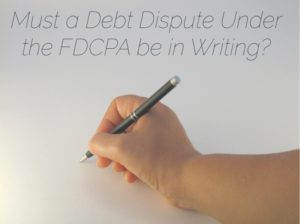By: Robert J. Nahoum

THE PROBLEM:
You’ve been contacted by a debt collection agency trying to collect a debt but you are certain you’ve already paid it. You tell the debt collector that you are officially disputing the debt? The question you are now asking yourself – is this oral dispute sufficient or must the dispute be in writing?
The Rule:
Federal debt collection laws called the Fair Debt Collection Practices Act (FDCPA for short), regulates the collection of consumer debts by third party debt collectors including collection agencies, junk debt buyers and debt collection lawyers. The FDCPA generally prohibits the use of false, deceptive and harassing debt collection tactics. If a debt collector violates the FDCPA, it can be sued for statutory damages up to $1,000.00, actual damages (like pain and suffering) and the debt collector may have to pay the consumer’s attorney’s fees.
While the FDCPA provides a non-exhaustive list of what sort of collection tactics debt collectors are precluded from using, it also includes a series of rights the consumer can assert. Included in these protections is the right to challenge and dispute the debt. This is an important protection because if a consumer notifies the debt collector that the debt is disputed, the debt collector must cease collection of the debt until the debt collector obtains verification of the debt.
As with many issues in the law, the answer is not always clear. Because different courts have interpreted the FDCPA differently, whether a debt dispute must be in writing depends on where you live.  Some jurisdictions have held that to be effective, a debt dispute must be in writing while others have said that disputes do not have to be in writing.
For the purposes of our clients, we can draw the line in the Hudson River – the Courts in the state of New Jersey require disputes to be in writing while in New York, disputes can be may orally.
WHAT YOU SHOULD DO:
If you live in the State of New Jersey and want to dispute a debt with a debt collector, do so in writing. Â Send the letter by certified mail, return receipt requested so, if necessary, you can prove that you made the dispute.
If you live in New York, while it is permissible to dispute the debt orally, it is still a good idea to do so in writing. This way, if necessary, you can prove that you made the dispute. If the debt collector ignores the dispute and continue to try to collect, contact a consumer attorney to see if you have a claim under the FDCPA.
The FDCPA gives consumers the power to turn the tables on the debt collector. If a debt collector has used false, deceptive or harassing debt collection tactics against you, call a consumer attorney to see if you have a case.  If you do, you can sue the debt collector for statutory damages up to $1,000.00, actual damages (like pain and suffering) and best of all, the debt collector may have to pay for your legal fees. This means an FDCPA case should not cost you a penny out of pocket.
If you need help settling or defending a debt collection law suit, stopping harassing debt collectors or suing a debt collector, contact us today to see what we can do for you. With office located in the Bronx, Brooklyn and Rockland County, the Law Offices of Robert J. Nahoum defends consumers in debt collection cases throughout the Tristate area including New Jersey.
The Law Offices of Robert J. Nahoum, P.C
(845) 232-0202
www.nahoumlaw.com
info@nahoumlaw.com
